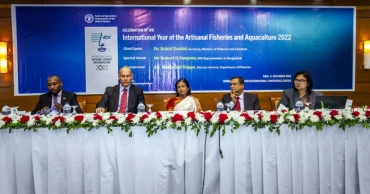aquaculture-reliant communities
Climate change has huge impacts on fishery, aquaculture-reliant communities in Bangladesh: Speakers
Speakers at a dialogue said communities that depend on fisheries and aquaculture in Bangladesh are at the forefront of climate change impacts.
They said small-scale artisanal (traditional) fisheries and aquaculture make an invaluable contribution to the country’s food and nutrition security and the fishing communities need assistance to adapt to the effects of climate change.
The speaker came up with remarks at a dialogue on ‘The impact of climate change on the country’s fisheries sector’ held on Sunday at Bangabandhu International Conference Centre in Dhaka to mark the International Year of Artisanal Fisheries and Aquaculture 2022.
The Food and Agriculture Organization of the United Nations (FAO) is the lead agency to celebrate the occassion this year in collaboration with other bodies of the United Nations.
They said more than one million people in Bangladesh depend on small-scale fisheries and aquaculture for their livelihoods. Nearly 90 percent of all marine capture in Bangladesh is from small-scale or artisanal fishers, they added.
Read more: FAO's regional conference endorses 'One Health Approach'
Robert D. Simpson, FAO Representative in Bangladesh, said “Small-scale fishers in Bangladesh make an invaluable contribution to the country’s food and nutrition security, as well as the rural economy. FAO is committed to working with Bangladesh to strengthen the fisheries sector, with a focus on helping fishing communities adapt to the effects of climate change.”
Norman, FAO’s Senior Technical Advisor for fisheries and climate change, said “Climate change is having profound impacts on fishery and aquaculture-reliant communities and the ecosystems they depend on, especially in tropical regions. Through capacity development and policy reform, FAO in Bangladesh is helping to build resilience in these communities so that they are better able to cope.”
Read more: UN: Climate change, depleted resources leave world hungry
Small-scale fishers and fish workers account for 90 percent of the people who work worldwide in capture fisheries values chains—with 492 million people depending at least partially on small-scale fisheries for their livelihoods, said speakers.
3 years ago

